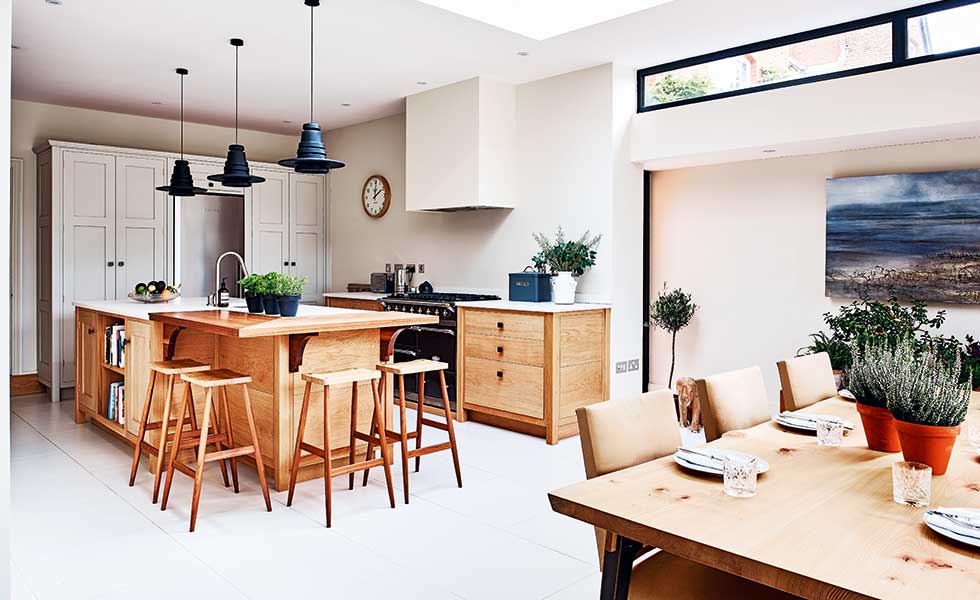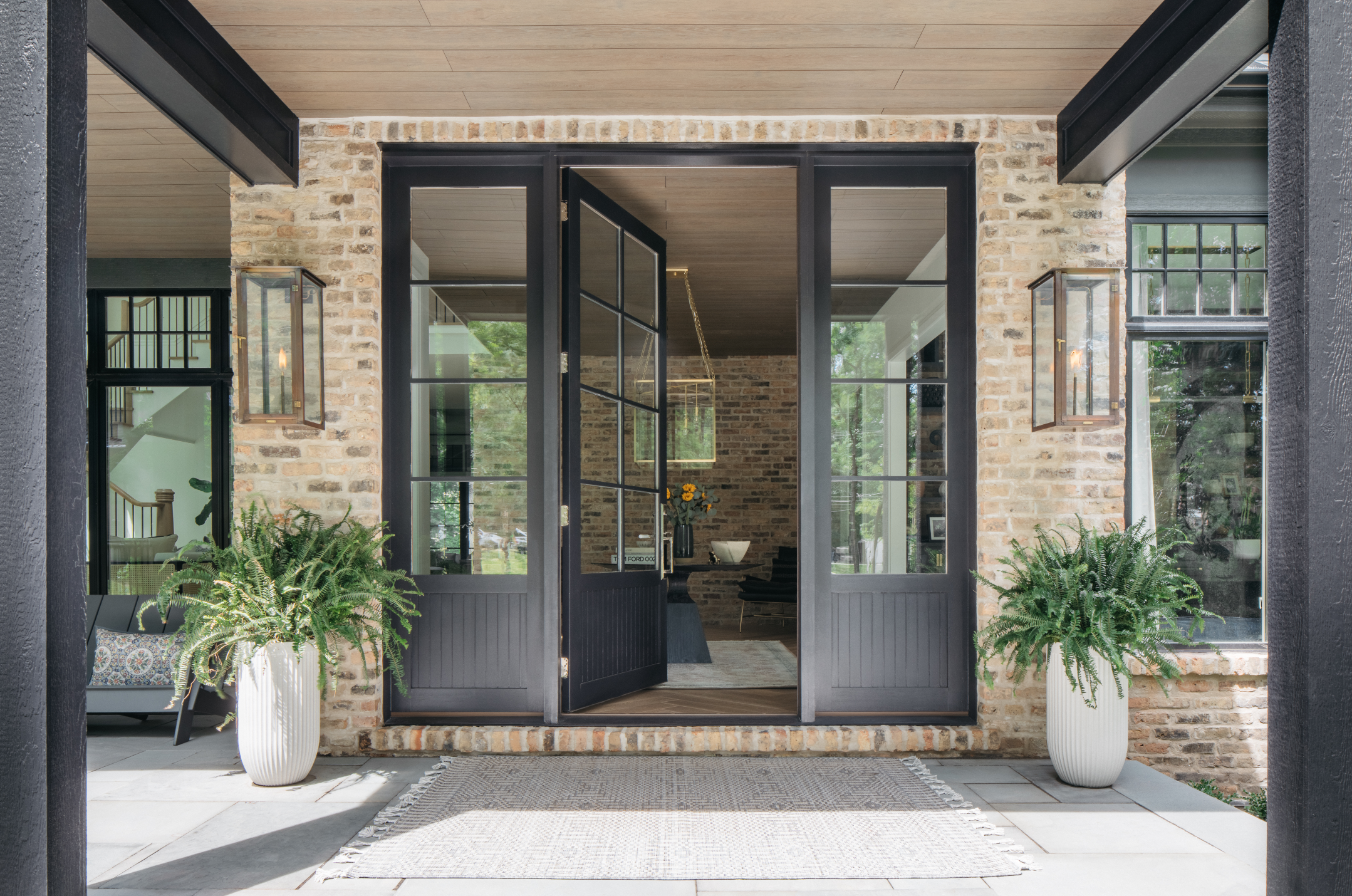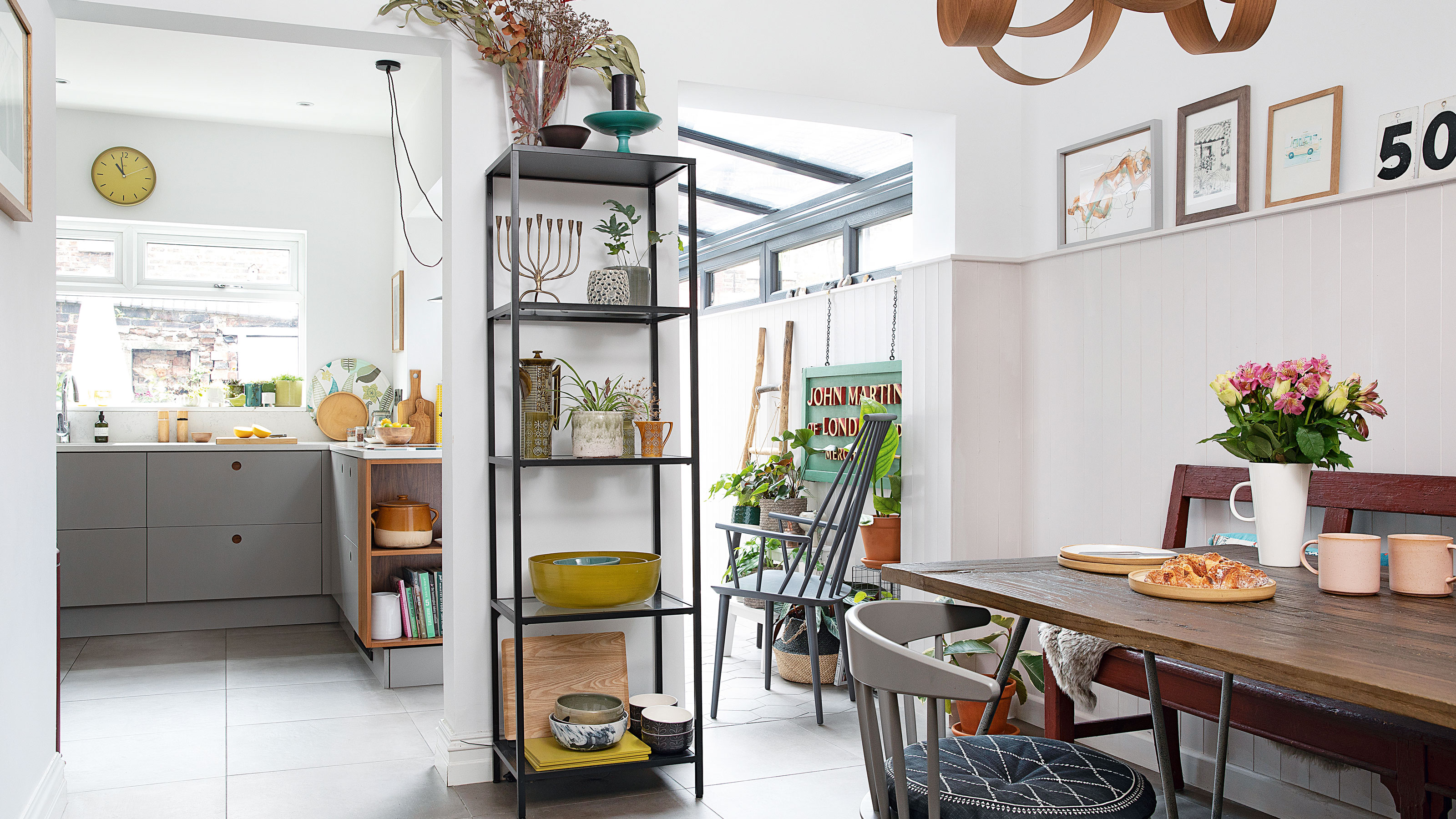
If you're about to embark on a renovation project, these tips will help you manage your new renovator role with panache. Experienced renovators have fine-tuned the art of planning, budgeting, and executing a renovation project, and we've drawn fro m their expertise for this guide. Follow these steps to make sure the process is as smooth and stress-free as possible.
Whether you're planning a one or two storey extension, conservatory or whole house renovation, our tips on house renovation are practical and applicable.
1. Establish a clear vision (while remaining open to new suggestions)
Before you can get started on a renovation you need to have an idea of what you might be looking to achieve. The clearer this vision, the better.
If you're stuck for inspiration spend time looking at other people's houses, magazines (Real Homes is a great place to start!), architecture websites and design books to create a mood-board.
You can add to this when you come across new ideas and hone others that might not work so well. Keep it as a ‘bible’ for your design vision and share what you’ve found with a designer once you’re ready.
This being said, try not to be too rigid and instead remain open to new suggestions. Focus on functional considerations rather than finishes, then turn practical necessities into design positives.
2. Find out what’s feasible
Once you’ve got well-rounded ideas for the design, you need to know what you can actually do to your property, legally (and financially) speaking. This includes finding out if you’ll need planning permission or whether you can achieve the new look under permitted development.
You’ll also need to ensure your ideas will meet with building regulations. If you live in a listed building or Conservation Area, now is the time to find out as strict guidelines may apply. You can start your research online at websites such as planningportal.co.uk.
In addition to researching what's legally possible, it's also important to think about what you're willing to put up with if you're planning on renovating a home that you already live in.
A comprehensive knowledge of a property is likely to result in a more cohesive design. However, it’s harder to be objective about your own house. People become set in their ways about things like layout, so are more closed-minded to swapping room functions around, even though this can be the key to unlocking potential. Buying a new property lets you approach a refurbishment with fresh eyes.
3. Don't worry about passing trends
Cosmetic changes and trendy additions should never take priority for a successful renovator. It's like the pyramid of needs: you need to satisfy the basics first, before you even think about experimenting with clever additions or on-trend changes (e.g. going open plan). Think of your house as a beautiful face: the bone structure is the most important thing, so – make sure the fundamentals like flooring, windows, walls, and doors are renovated to the highest possible standard. Changing the room layout and remodelling individual rooms comes after, budget permitting.
4. Calls in the experts
For large-scale projects, perhaps if you are extending a house, converting a loft or basement, or whole house renovations, successful renovators will consult an architect or architectural designer.
Keep in mid that working with existing buildings is an art form. A neglected home can be transformed through renovation and by working with professionals you'll benefit from both their design and planning knowledge. If your vision for a renovation isn't possible, an architect will be able to talk you through the alternatives.
For smaller projects or internal reconfigurations, ask a trusted builder to offer guidance, plus consult a structural engineer to ensure any wall movements are safe. Similarly, plumbers, joiners, kitchen fitters and electricians can offer expert advice on specific areas of the project.

5. Check in with the council
Keeping in touch with the council throughout a project is always a good idea. Any planning applications will have to go to the local authority, but you can get in touch before this stage to seek rough guidance on what will be accepted.
Remember though, this doesn’t constitute any guarantees of approval and certainly doesn’t mean you don’t need to formally apply for permission. The council can also deal with building regulations approval, so can organise a building control officer to visit your property before, during and after the renovation at various stages.
6. Set a realistic budget, plus a little extra just in case
Working out how much you can afford to spend and what you can realistically achieve within that budget is key to any successful project. It’s a good idea to discuss this with your designer or builder, as they may be able to advise on where savings can be made. We have plenty of tips to help you cut the cost of your extension, too.
Decide early how much you’ll spend on the fixtures, fittings and finishing touches and try to stick to your allocated amounts, as changes to a design later on can be costly.
It’s always wise to have a contingency budget, too. A 10 per cent buffer should be sufficient, but work out if you can afford more than that.

7. Employ the right team
Successful renovators know that having the best team on board is key. You should start by putting together a tender document outlining exactly what work needs to be done and which trades are needed.
Then, search locally for the people you need; ask friends and family for recommendations; look out for reviews online and search via trade associations, such as RIBA, The Federation of Master Builders, Chartered Institute of Architectural Technologists (CIAT) or The British Institute of Kitchen, Bedroom and Bathroom Installers (BiKBBI).
Get at least three quotes and compare, taking into consideration previous work, reviews and responsiveness, plus whether you get on, before making a decision on which to hire.
Use our guides to hire a reliable builder and to find the right build project team.

8. Ask friends and family for help
Know anyone who’s a builder, plumber, electrician or keen interior designer? Ask them for some free advice on your project, or if they can offer their services for a reduced rate. Even if they’re not in a trade, they may be able to recommend someone who is.
Don’t be shy to ask friends and family to help out when it comes to removing furniture, stripping walls or decorating, so long as you can make a good cuppa and have a tasty stock of biscuits. You can always repay the favour.

9. Know when to DIY
If you’re asking friends and family to help, you'd better be prepared to do your bit, too. From clearing rooms, sanding skirting boards to ripping out old furniture and carpets, you’ll be able to get involved, no matter your skill level. And the more projects you take on, the more skills you’ll gain.
A renovator doesn't have to be a DIY enthusiast, but particularly if you'll be staying in the property, there are jobs you can tackle to speed up the process and save money.
10. Set a realistic timeframe
Always keep in mind that a good quality renovation takes time. Do plenty of research, finalise the design, gain the correct permissions and find the right trades. Always ask the professionals for an as-close-to-accurate timescale as possible. Keep a calendar to mark key stages in the project and keep track of who’s doing what each week.
A well-managed project will always run more smoothly, but don’t be surprised if some unforeseen occurrences happen to delay proceedings. When this happens, work out the best plan to move forward. Rushing a renovation could result in sub-standard finishes, while dragging it on could incur more expense. Work with your team and be honest about your expectations.
Use our week-by-week extension planner for an idea of what's involved with that particular project.
11. Be honest about time and money
As well as setting a realistic budget, successful renovators are totally up front about what they have to spend. This will stop your designer and trades providing you with ideas that are out of your reach. Be open and you’ll get the best results for you.
12. Decide on your living arrangements
Savvy renovators know when to live on site and when to find temporary accommodation for part of the build. If living on a building site is your idea of hell, look around at local rental properties, so you can be close by to keep an eye on proceedings, or ask nearby family or friends if they can put you up.
Make sure they have enough room, though – you don’t want the stress of two families crammed in one house on top of that of managing a project.
Use our dedicated renting hub page for advice on renting while renovating.

13. Stay in touch with the builders
Once the project is up and running, successful renovators will set up a weekly meeting with your main contractor or project manager to find out what’s been done and what’s planned for the coming week. This will not only mean your trades are meeting deadlines for tasks to be completed on time and within budget, but you’ll also feel fully informed and in the loop.
14. Ask lots of questions
Just because you’re renovating your home doesn’t mean you have to become an expert in construction methods or architectural design. Although it pays to have a basic understanding of the modes and materials used so you know exactly how a space is designed, there are bound to be technical terms, jargon and practices that are complex – this is why you hire the experts, after all.
Take every opportunity to ask questions, whether to your designer, builder, plumber or glazing specialist. If there’s something you don’t understand, ask.

15. Be prepared for quick decision making
Not to throw in too many clichés, but you need to expect the unexpected and remember that time is money. Unforeseen occurrences are annoying and can cause delays in a schedule or mean you have to dip into your contingency budget. But if something goes wrong, the quicker you make a decision on how to rectify it, the better.
As a build progresses, you may be asked about anything from the gaps in grouting, the depth of door frames or whether you want the paint in the hallway to carry into the living room, so be clear from the outset on exactly what you want – and stick to it.
Find out about project managing a renovation or extension for more information.
16. Maintain a clear vision
Experienced renovators know that changes to the design once work has started, especially structural, will cost money. While changes can be unavoidable, try to iron out any issues before construction begins. With a clear idea of how you want your home to look from the very start, you should remain confident that it will be exactly how you envisaged it.
17. Watch it all come together with pride
After months of planning, making decisions, debating design choices, weighing up costs, possibly moving out of your home, and keeping track of progress, you’ll soon realise all the effort and time spent was worth it as your dream home or room begins to take shape.
Remember, if it seems like those last stages take an age (mostly because you’re dying to move in and use the new space), keep thinking about how great it will feel when you can finally put your feet up and relax at the end of your successful renovation project.

Discover how this Scandinavian-inspired kitchen extension came together, transforming a dated semi-detached period home in a Conservation Area
More handy tips to successfully renovate your home...
- House renovation costs: how much does it cost to renovate a house?
- 16 renovation mistakes to avoid
- Permitted development rights explained
Join our newsletter
Get small space home decor ideas, celeb inspiration, DIY tips and more, straight to your inbox!
Anna is a professional writer with many years of experience. She has a passion for contemporary home decor and gardening. She covers a range of topics, from practical advice to interior and garden design.
-
 This colourful home makeover has space for kitchen discos
This colourful home makeover has space for kitchen discosWhile the front of Leila and Joe's home features dark and moody chill-out spaces, the rest is light and bright and made for socialising
By Karen Wilson
-
 How to paint a door and refresh your home instantly
How to paint a door and refresh your home instantlyPainting doors is easy with our expert advice. This is how to get professional results on front and internal doors.
By Claire Douglas
-
 DIY transforms 1930s house into dream home
DIY transforms 1930s house into dream homeWith several renovations behind them, Mary and Paul had creative expertise to draw on when it came to transforming their 1930s house
By Alison Jones
-
 12 easy ways to add curb appeal on a budget with DIY
12 easy ways to add curb appeal on a budget with DIYYou can give your home curb appeal at low cost. These are the DIY ways to boost its style
By Lucy Searle
-
 5 invaluable design learnings from a festive Edwardian house renovation
5 invaluable design learnings from a festive Edwardian house renovationIf you're renovating a period property, here are 5 design tips we've picked up from this festive Edwardian renovation
By Ellen Finch
-
 Real home: Glazed side extension creates the perfect garden link
Real home: Glazed side extension creates the perfect garden linkLouise Potter and husband Sean's extension has transformed their Victorian house, now a showcase for their collection of art, vintage finds and Scandinavian pieces
By Laurie Davidson
-
 I tried this genius wallpaper hack, and it was perfect for my commitment issues
I tried this genius wallpaper hack, and it was perfect for my commitment issuesBeware: once you try this wallpaper hack, you'll never look back.
By Brittany Romano
-
 Drew Barrymore's new FLOWER Home paint collection wants to give your walls a makeover
Drew Barrymore's new FLOWER Home paint collection wants to give your walls a makeoverDrew Barrymore FLOWER drops 27 brand-new paint shades, and every can is made from 100% post-consumer recycled plastic.
By Brittany Romano